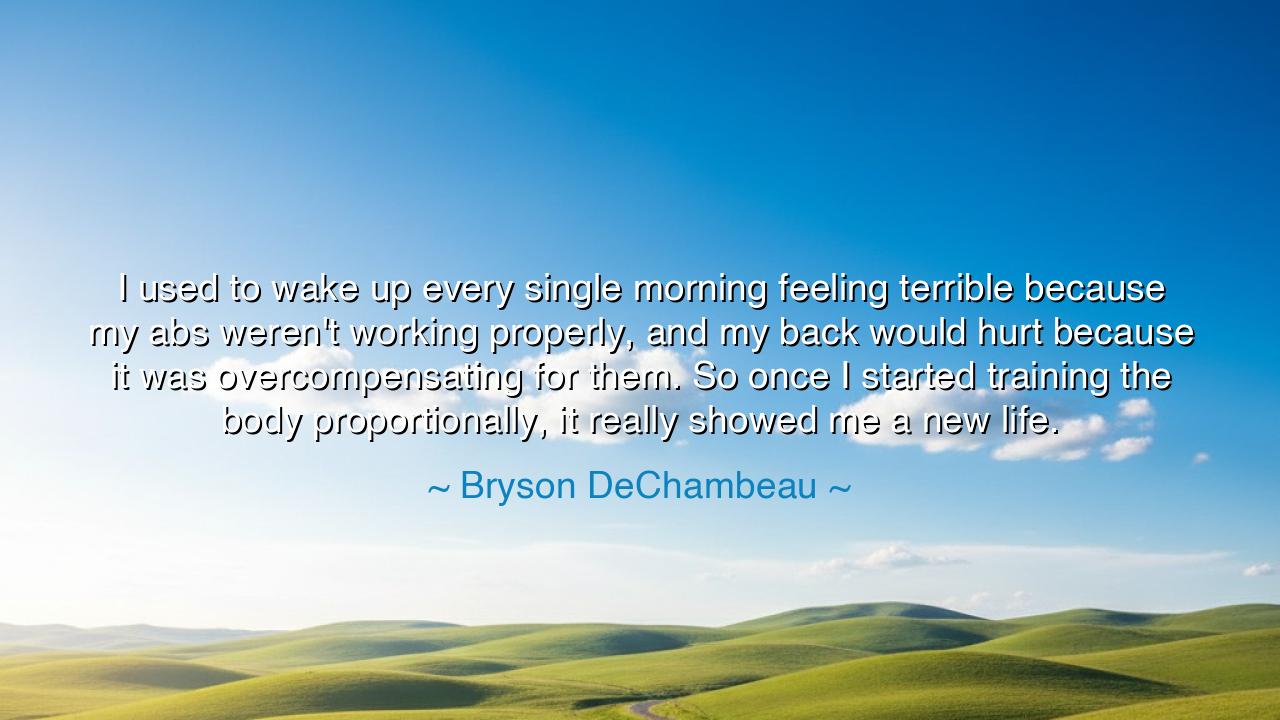
I used to wake up every single morning feeling terrible because
I used to wake up every single morning feeling terrible because my abs weren't working properly, and my back would hurt because it was overcompensating for them. So once I started training the body proportionally, it really showed me a new life.






In the ancient pursuit of mastery, whether in battle, in philosophy, or in the craft of living, there lies a powerful lesson in balance. Bryson DeChambeau, a modern athlete known for his precision and dedication, reflects on this principle when he says, "I used to wake up every single morning feeling terrible because my abs weren't working properly, and my back would hurt because it was overcompensating for them. So once I started training the body proportionally, it really showed me a new life." These words speak not only to the importance of physical balance, but also to the deeper understanding that true strength comes from harmony, from ensuring that every part of the body, every aspect of our being, works together in unison.
In the ancient world, the greatest warriors were not simply those with great strength in one area, but those who understood the delicate art of balance. The great Greek warriors, for instance, were trained not just in combat but in the understanding of the body's proportions and abilities. They knew that a warrior with strong arms but weak legs would be defeated as easily as a warrior with a strong core but frail arms. The ideal warrior was one who trained all parts of the body, ensuring that no single part would become overburdened or overcompensated. This proportionality was key to enduring physical and mental strength.
DeChambeau's reflection echoes this ancient wisdom. In his early struggles, his body’s imbalance—where the abs were weak, and the back overcompensated—mirrored the ancient knowledge that one part of the body cannot thrive if others are neglected. In battle, as in life, imbalance leads to weakness. A warrior might possess the strength to wield a sword with incredible power, but if his legs are weak or his back unsupported, that strength becomes a liability. DeChambeau’s realization was that the body, like a finely tuned weapon, must be trained as a whole—not with a focus on isolated strength, but on the harmonious development of every part.
Consider the story of the legendary Hercules, whose great feats were not simply the result of his raw strength, but of his ability to adapt and overcome. The Twelve Labors of Hercules demanded not only the strength to carry out Herculean feats but the ability to use his entire body in harmony to overcome challenges. When faced with the task of cleaning the Augean stables, Hercules used his ingenuity and strength, not relying solely on one part of his body, but understanding how to employ his entire physicality to complete the task. In the same way, DeChambeau's journey to balanced physicality was not just about building strength in isolation, but about training his body to work together, ensuring that no part would be left to suffer under the weight of the others.
In DeChambeau’s experience, we see not just the physical benefits of training the body proportionally, but the mental and emotional rejuvenation that comes from it. As Hippocrates, the father of medicine, once said, "If you are in good health, everything is easier." There is a deep truth in this, for the body and mind are interconnected, and when the body is in balance, the mind follows. When DeChambeau began to train his body with a focus on proportionality, it did not just ease his pain—it unlocked a new life, where his mind could work more clearly, his body could perform more efficiently, and his spirit could thrive.
The lesson here is timeless and profound: true strength and vitality are found not in excess, but in balance. The journey to greatness, whether in athletics, in battle, or in life itself, requires the understanding that no part of us can be neglected. Just as the greatest warriors of antiquity trained their bodies in unity, so too must we strive to cultivate balance in all aspects of our being. Strength is not about isolating one part of ourselves for dominance, but about ensuring that all parts—mind, body, and spirit—are working together harmoniously.
Let this wisdom guide us as we navigate our own journeys. In whatever we pursue—whether in physical pursuits, intellectual challenges, or emotional growth—let us remember that true mastery comes from the balance of all things. Train your body, your mind, and your spirit in harmony, so that no part of yourself is overburdened or left behind. Just as DeChambeau found new life by addressing his body’s imbalances, so too can we find strength, clarity, and vitality in our own lives by seeking balance and training ourselves to be whole.






AAdministratorAdministrator
Welcome, honored guests. Please leave a comment, we will respond soon